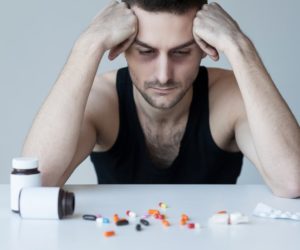Hydrocodone Overdose Symptoms

Become familiar with hydrocodone overdose symptoms and get help before it’s too late.
Hydrocodone is one of the most frequently prescribed opioid medications in the United States. According to the Centers for Disease Control and Prevention, it falls within one of the four classes of opioids, called semi-synthetic opioid analgesics. Other drugs in this class include, oxycodone and hydromorphone. This class of opioid has seen a surge in overdose deaths from 2000 to 2015, beating out heroin and other synthetic opioids. It is important to research hydrocodone overdose symptoms. Read more.
There are over 200 prescription medications that contain hydrocodone that are available, as it is widely used for pain management and is also used as a key ingredient in many cough suppressants. The effects of this drug can last for six hours, and dependence can develop within a short period. People are drawn to this drug because it produces euphoric feelings, a heightened sense of well-being, numbness, feelings of relaxation, and reduced worrying. While many individuals become addicted to hydrocodone through illicit abuse, dependency also starts in many cases through a valid prescription that is obtained under legitimate medical circumstances.
It is easy to develop a tolerance to hydrocodone and it is typical (though not normal) for users to start taking more of it over time in order to receive the same effects. While some users may develop large tolerances to hydrocodone, increasing toxicity levels of the drug in the body are dangerous and raise the risk for overdose. It is important to become aware of hydrocodone overdose symptoms so that you can react quickly if you or a loved one is at risk. Abuse of hydrocodone or prolonged use of the drug can cause side effects as well. Here are some affects you may experience if you have been taking this drug for an extended period:
- Slowed heart rate
- Respiratory (breathing) problems
- Increased risk of depression
- Constipation
- Low testosterone in males
- Weakened immune system
- Decreased libido in both men and women
Not only is the user prone to hydrocodone side effects that can become pronounced after long term use, someone who is physically dependent on hydrocodone who has not taken a dose when they normally would make experience hydrocodone withdrawal. Symptoms of hydrocodone withdrawal can be intensely uncomfortable, driving the user to take another dose even when they are trying to stop using the drug. Symptoms of hydrocodone withdrawal include:
- Abdominal cramping
- Diarrhea
- Dilated pupils
- Nausea
- Vomiting
- Chills
- Anxiety
- Muscle aches
- Sweating
- Insomnia
- Agitation
While withdrawal from hydrocodone is not life threatening, withdrawal symptoms are signs that the body needs time to recover. Symptoms, intensity, and duration of hydrocodone withdrawal vary from person to person. Conversely, it is essential to be able to identify hydrocodone overdose symptoms, as an overdose requires immediate action and can be fatal. Hydrocodone overdose symptoms include:
- Shallow breathing, or the individual may even stop breathing.
- Extreme fatigue
- Vomiting
- Small pupils
- The individual loses consciousness.
If you suspect that you or a loved one may be experiencing hydrocodone overdose symptoms, it is imperative to call 911 immediately. Individuals have the best chance of surviving a hydrocodone overdose if help is received before respiratory problems begin. As breathing slows, oxygen levels deplete. When this happens, individuals are at risk for brain damage if treatment is not administered right away.
If you find that you are not taking prescription medications as prescribed, that it takes more pills than what is directed to treat your pain, call your doctor right away. This is the first sign of dependency. Your doctor can assist you with weaning off of hydrocodone if the issue is brought to his or her attention right away and will find an alternative medication to treat your medical condition that is effective and safe. For individuals experiencing chronic pain, there are alternative non-drug therapies that can help alleviate discomfort that include lifestyle adjustments, exercise, acupuncture, massage and behavioral therapies. These methods can reduce pain and increase the ability to function. If you have been prescribed opioid medication for pain, follow the guide for safe use of opioid drugs, which include:
- Reading the label and taking the drug only as directed.
- Making sure your doctor knows if you have any family history of addiction.
- Informing your doctor if you have sleep apnea before starting any opioid medication. Opioids can make sleep apnea worse or even be fatal.
- If you develop a cold, have asthma, bronchitis, or any other type of respiratory issue, notify your doctor immediately.
- Discuss with your doctor how your use of the prescription opioid medication will be monitored. If pain and function does not improve by at least 30 percent after starting the medications, the risks of taking it may not be worth it.
If you or a loved one needs help with abuse and/or treatment, please call the WhiteSands Treatment at (877) 855-3470. Our addiction specialists can assess your recovery needs and help you get the addiction treatment that provides the best chance for your long-term recovery.
